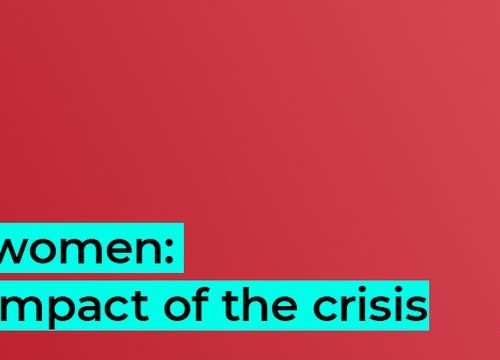Right On – Women and COVID-19: The Gendered Impact of the Crisis
Right On


Geneva Internet Platform
It has become clear in recent weeks that this pandemic and the concurrent economic crisis is impacting women differently than men.
Women, who already shoulder a disproportionate share of unpaid care work, have come under even more pressure as schools and daycares have closed. Many are also at an increased risk of exposure to the virus, since they work on the frontlines of our global effort against the pandemic, providing essential medical and other services. In the future, they are also more likely to be disproportionately affected by the economic shocks that will follow the pandemic, as they represent a higher percentage of persons in precarious, informal, or poorly paid work.
Additionally, the current lockdown orders, which are in place in a majority of the world’s States is likely to exacerbate the incidences of domestic violence at a time when shelters are closing and women can’t leave their homes.
Our Wednesday ‘Right On’ web chat will highlight key women’s rights concerns during the pandemic, and look to develop recommendations for how governments can mitigate the negative impact of their crisis policies on women. Finally, the discussion will aim to identify opportunities to ‘build back better’ from the crisis and re-energise progress towards Sustainable Development Goal 5 and gender equality.
Moderation
- Anniken Enersen, Minister Counsellor, Permanent Mission of Norway in Geneva
Speakers
- Michelle Bachelet, United Nations High Commissioner for Human Rights
- Monica Ferro, Director, United Nations Population Fund (UNFPA) in Geneva
- Liera Socorro Flores, Permanent Representative of Mexico to the United Nations Office and other International Organisations in Geneva
Registration
To join the discussion, you need to register here.
‘Right On’: The Wednesday Web Chat
‘Right On’ is a new digital initiative – co-organized by the Geneva Academy, the Geneva Human Rights Platform, the Geneva Internet Platform, the DiploFoundation, the Universal Right Group, the Human Rights Centre at the University of Essex, the Human Rights, Big Data and Technology Project, UNFPA, the World Jewish Congress, as well as the Permanent Missions of Denmark, Norway and the Netherlands to the United Nations in Geneva – that will keep the human rights dialogue going during these COVID-19 times.
Every Wednesday at 15:00, experts and practitioners will discuss key human rights issues related to the current health crisis.
Video
Right On – Women and COVID-19: The Gendered Impact of the Crisis
In this fourth event of the ‘Right On’ digital initiative, panelists discussed the gendered impact of the COVID-19 crisis with Michelle Bachelet, UN High Commissioner for Human Rights.










